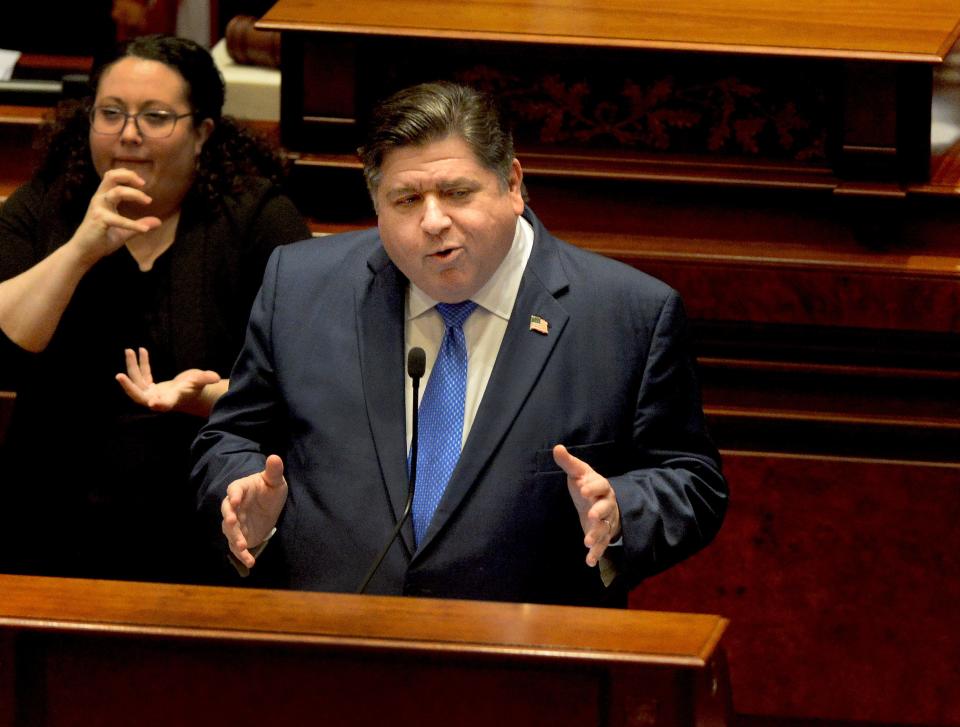Budget breakdown: Tax increases draw ire from Illinois lawmakers
- Oops!Something went wrong.Please try again later.
- Oops!Something went wrong.Please try again later.
Gov. JB Pritzker and fellow Democrats would like bipartisan support in this year's state budget.
“Now, I expect that some of you will want to spend more, and some of you will claim you want to spend less,” Pritzker said during his budget address Wednesday in the House chamber. “Know this: I am always open to good ideas that members of both parties have to more efficiently and effectively fulfill our obligations.”
If immediate reaction to the governor's budget address is any indication, however, it will likely not come to pass.

More: Pritzker’s budget proposal calls for child tax credit, elimination of grocery tax
For Republicans, House Minority Leader Tony McCombie appreciated that Pritzker's proposal included adequate funding for education and taking steps to reduce pension debt. Still, a projected $800 million in tax increases and continued spending on migrants was an issue.
No GOP lawmakers voted for the budget last year, including state Sen. Steve McClure of Springfield. High taxes, he said, have already placed a burden on local businesses — pointing to the recent temporary closure of Loukinens’ on 4th and the permanent closure of Alexander's Steakhouse.
"Why isn't the governor prioritizing people like them?," McClure said following the speech. "Instead, he is prioritizing people of other countries and also encouraging them to keep on coming."
Democrats hold super-majorities in both the House and Senate, making for friendlier turf for Pritzker, and many expressed their support for a proposed child tax credit and a $10 million first-year commitment to reduce medical debt. Senate President Don Harmon called the proposal a "good start."
State Sen. Robert Peters made similar remarks and emphasized an improved budgeting process under Pritzker compared to former Gov. Bruce Rauner. Responsible use of taxpayer dollars and federal funding such as the American Rescue Plan have allowed for this betterment, he said.
“We’re now entering a new era where we don’t have the luxury of ARPA,” said Peters, D-Chicago. “But we need to make sure that we are giving people the luxury of dignity and may that dignity come from GRF (General Revenue funds) and federal programs.”
The governor's $52.7 billion proposal paves way to the General Assembly's work over the next three months in passing a state budget. Lawmakers are scheduled to end the spring session on May 24, but have until the end of the fiscal year on June 30 to pass the budget.
Further budget critiques
While increased spending in some initiatives angered Republicans, others were disappointed by how state funds could be allocated under the proposal.
The governor proposed using $175 million from the Road Fund, transferring it from sales tax, to cover public transit expenses. The Road Fund, co-chairs Patrick Hosty and Kevin Burke of the Transportation for Illinois Coalition, is typically delegated to cover road, bridge, and transit capital improvements.
Using this funding for public transit would ballon to north of $1 billion lost for road and bridge improvements over the next few years, the coalition projected.
"After decades of inadequate funding, Gov. Pritzker and the Legislature invested billions of dollars to improve thousands of miles of roads and bridges – including the largest road program in state history this year," they said in a statement, referring to the Rebuild Illinois initiative. "Illinois cannot afford to move backward now."
'Significant step backwards'
Others were wanting higher wages, like the Service Employees International Union Healthcare Illinois.
The union represents 45,000 child care providers and home care workers throughout the state and is promoting a pathway for workers to receive $25 per hour.
Similarly drawing the ire of the Illinois Association of Rehabilitation Facilities, the proposal also does not increase wages for disability service providers — a "significant step backwards," IARF said as it deals with hiring struggles.
More focus on education
One of the things that was again top priority in Pritzker's budget proposal was funding for education. This includes funding for early childhood development programs, K-12 schools, and higher education.
Pritzker emphasized the importance of early childhood program Smart Start Illinois, which has opened more than 80,000 publicly funded preschools since the start of the program.
Part of the governor's budget includes proposing $400 million of maintained funds.
Also allocating $13 million in funds to launch a new agency, the Department of Early Childhood aims to help parents and providers find early childhood programs and resources.
The budget also includes investing more into the Teacher Pipeline Grant Program.
The program was introduced in the last budget with the governor setting aside $70 million to be sent out to 170 different school districts that accounted for vacancies in the state.
The different districts were allowed to use those funds however they needed including signing bonuses, providing apprenticeships and even reimbursing tuition and fees.
The governor stated that thanks to the program there has been an increase of teachers, and students in schools. He wants to add an additional $45 million dollars for the program in hopes of getting more educators in the field.
Contact Patrick M. Keck: 312-549-9340, pkeck@gannett.com, twitter.com/@pkeckreporter; Contact Hope Gadson: hgadson@gannett.com
This article originally appeared on State Journal-Register: Proposed $52 billion Illinois budget includes tax increases

